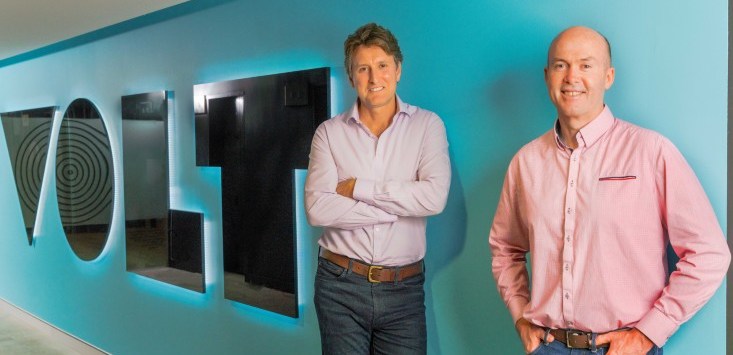
Steven Worrall, managing director for Microsoft Australia, and Volt co-founder and chief Steve Weston. Source: supplied.
Aussie neobank Volt has announced a strategic partnership with Microsoft and tech provider LAB3, to develop its Banking-as-a-Service platform, which Volt founder and chief Steve Weston believes will usher in a new age of banking for business.
Volt 2.0 will allow businesses to offer white-labelled banking products directly to their own customers, including secure data storage and analytics capabilities, all based on Microsoft Azure’s cloud service.
Speaking with SmartCompany, Volt co-founder and chief Steve Weston says this latest iteration of the neobank was always part of the plan.
Back in 2017, when the co-founders were building the bank, they kept two questions front-of-mind, he explains.
“One was: ‘What will customers want in the future?’
“The second question was around evolving, and ‘what will banking tech of the future look like?’”
Volt 2.0 brings a platform solution to an industry that’s not exactly known for its innovation.
“Throughout almost all industries, platforms have entered the market and are dominating,” Weston explains.
“That’s not been the case in retail banking.”
The service is focused on big businesses with large numbers of customers — think large retailers or airlines.
While they may have offered something like a credit card in the past, they haven’t been able to offer a range of banking and payments solutions.
For a corporation with a loyal customer base, it offers an opportunity to do more for them, and ultimately, make more money from them, Weston explains.
It can also reduce friction between customers and businesses.
“At the end of the day, anything that requires payment needs a bank to be part of that coalition.
“What we have built is a banking capability that can be used not just for Volt Bank-originated customers, but for customers that have been referred or originated by the corporate,” Weston says.
“I believe that is the future of banking.”
An inflection point
With the COVID-19 pandemic playing havoc on the Aussie, and global, economy, this might not feel like an ideal time to be making a grand play to change the very way corporates approach banking.
But, Weston notes this is something Volt has been working on in stealth mode for some time.
It’s not the neobank’s style to shout too loudly about what it’s doing before its products are ready, he notes.
Volt was one of the later neobanks to launch its beta product for customers on its waiting list. And, as of yet, it still hasn’t opened up to the public.
Weston explains that the startup is holding off until it launches its lending product. And it’s holding off launching its lending product until the economic crisis has abated a little.
“We want to make sure the economy had started to stabilise before we begin lending,” he says.
“We’re starting with a beautiful clean balance sheet.”
This delay shines some light on how COVID-19 has affected the growth of the neobank sector in Australia.
While in 2019, it seemed like every week brought a new neobank story, things have been notably quieter in 2020.
Weston says COVID-19 may have been detrimental to the space “to a degree”.
Things have been challenging for all startups, including fintechs and neobanks, he says.
“It’s been a bit more challenging to raise capital,” he notes.
“And banks are capital-intensive animals.”
Some neobanks have raised smaller amounts of capital than they had originally planned, meaning they may have had to rethink their costs and slow down a little, he notes.
But, he also thinks the sector is going to come out the other side of the crisis stronger.
“Coming out of COVID, there’s no doubt the neobanks are going to be in a better position.”
First of all, they will all have that clean balance sheet, Weston says.
“They’re not going to be distracted with managing hardships cases, which the incumbent banks will.”
But, more people are likely to consider themselves as digital banking customers, he adds.
“Everyone has had to live their life more digitally,” he explains.
“That’s definitely going to be a net positive.”
Volt, the founder says, has been plugging away during this time, getting its ducks in a row and making sure it’s ready to make its move when the time is right.
“We’ve just kept our heads down, we’ve got our deposit products lined up and lending ready to go well in advance.”
He’s also already fielding interest from corporate partners interested in Volt 2.0.
“Bring it on,” he says.
NOW READ: The Aussie neobanks are here, but have they delivered?


COMMENTS
SmartCompany is committed to hosting lively discussions. Help us keep the conversation useful, interesting and welcoming. We aim to publish comments quickly in the interest of promoting robust conversation, but we’re a small team and we deploy filters to protect against legal risk. Occasionally your comment may be held up while it is being reviewed, but we’re working as fast as we can to keep the conversation rolling.
The SmartCompany comment section is members-only content. Please subscribe to leave a comment.
The SmartCompany comment section is members-only content. Please login to leave a comment.